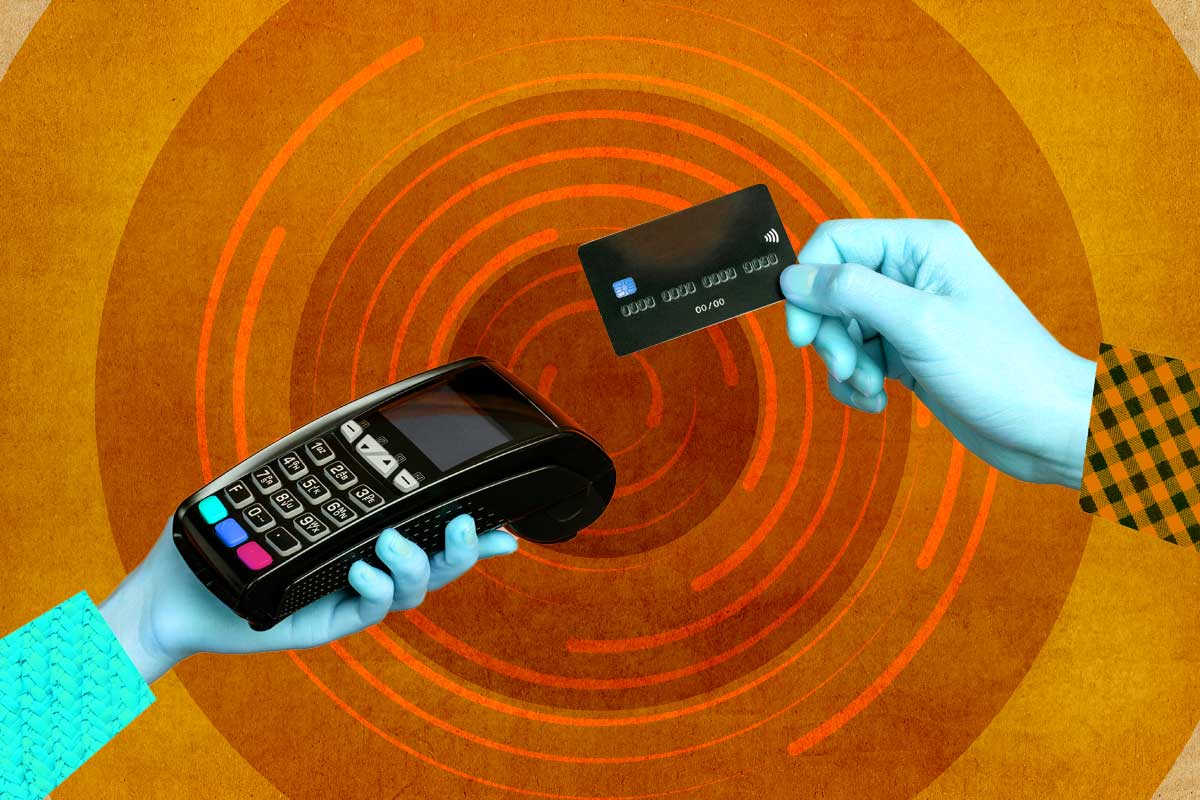Digital Payments and Currencies: The Changing Financial Landscape in the Middle East
As digital currencies and payments take center stage, privacy, and security should be a priority, say experts.
Topics
NEXTTECH
News
- Private Sector to Outpace Governments in $20 Billion Earth Intelligence Market
- Saudi Arabia to Add 112MW to Data Centre Capacity in New Deal
- UAE Dominates Global Data Centre Rankings as Region Becomes Digital Infrastructure Hotspot
- AI Adoption Climbs 233% Globally with the Middle East Showing Similar Momentum, Report finds
- du Launches UAE’s First Sovereign Hypercloud for Government and AI Innovation
- Ooredoo Launches Sovereign AI Cloud in Qatar Powered by Nvidia GPUs

[Source photo: Venkat Reddy Marri/MITSMR Middle East]
In the early ’60s, the invention of the magnetic stripe was ground-breaking—it laid the foundation for the modern payment card. Fast forward 60 years and payment technology has become smarter, more secure, and more sustainable.
From the introduction of PIN to digital wallets and contactless, innovation in the payments industry has driven a new era in how we interact and transact.
But progress also means retiring technologies that no longer meet consumer and merchant demands and embracing those driving forward the next evolution of payments.
Though in its nascent stage, blockchain-based digital currencies offer near-instantaneous transactions that are cost-effective, borderless, and transparent, prompting many organizations and governments to reevaluate prevailing economic models.
“Blockchain is a technology of trust. It’s a technology of identity management. Through the various protocols provided in blockchain, we can easily attribute AI ownership and attribution,” said Jorge Sebastiao, Co-Founder and Executive of Global Blockchain Organization.
Experts say blockchain—the technology behind digital currencies that promises to automate transactions and transform industries—will play a key role in the transformation of the economy.
Digital Transformation in the Middle East
According to Geography of Cryptocurrency Report 2023 by Chainanalysis, the Middle East & North Africa (MENA) has the sixth largest crypto economy of any region, with an estimated $389.8 billion in on-chain value received between July 2022 and June 2023.
Turkey is fourth in raw crypto transaction volume worldwide, receiving approximately $170 billion over the last year.
Saudi Arabia leads the world in year-over-year crypto transaction growth, according to the report. The biggest standout is the UAE, which sees a much higher share of crypto activity on Decentralized finance, or DeFi, protocols than its regional neighbors.
Blockchain is a technology of trust. It’s a technology of identity management.
Could a new digital currency designed to work alongside local currencies unlock a wealth of cross-border opportunities? Yes. According to experts, an international development priority is to use blockchain to promote financial inclusion and faster remittance.
“It’s (UAE) a market full of expats who send money to home countries. So, the capacity of digital currencies and virtual assets to make the whole process of remittances, and make a whole load of people’s lives better and cheaper in terms of that and from a social impact point of view, that’s potentially vast across the whole GCC region, but particularly in the UAE,” said Deepa Raja Carbon, Managing Director & Vice Chairperson of Virtual Assets Regulatory Authority (VARA), the organization responsible for regulating and overseeing the provision, use, and exchange of virtual assets in the UAE.
With the initiation of the Dubai Digital Authority in 2021, the message was very clear from the leadership — “digitize life in Dubai.” “It’s not only the government; it’s the entire ecosystem’s responsibility to digitize life and make the quality of life of the citizens, investors, and tourists high quality,” said H.E. Dr. Moza Suwaidan, CEO of the Digital Applications and Platforms Sector, Digital Dubai Government Establishment, Digital Dubai. She added that partnership with the private sector became an important pillar to achieve that goal.
What’s Next?
The pace at which the digital transformation is happening has left the regulators, businesses, and consumers playing catch-up. This has also prompted central banks in the region to act to ensure they don’t fall behind on innovation.
Talking about Central Bank Digital Currency (CBDC), public sector-issued digital currency, Peter Smith, Managing Director, Head of Policy and Strategy, Dubai Financial Services Authority (DFSA), said, “Everyone seems to want a CBDC. But not everybody’s sure what they want one for.”
According to research by the US-based Atlantic Council, 130 countries are exploring digital versions of their currencies.
In the Middle East, the UAE expects to complete the first phase of its CBDC – The Digital Dirham- strategy around mid-2024. In January, Saudi Arabia’s central bank, SAMA, announced increasing research into CBDCs. The International Monetary Fund, early this year, released a CBDC viability report on Jordan’s payments space.
“CBDCs are not a science experiment anymore. They are out of the lab,” said Saqr M. Ereiqat, Co-Founder of Crypto Oasis Ventures, adding that it will become more and more a traditional method of payment in the future.
DeFi, a global, peer-to-peer financial service based on blockchain technology, removes the need for traditional centralized intermediaries. It is faster and more inclusive.
“DeFi transactions use multiple networks, so the single point failure is mitigated to a large extent. When you talk about transparency, it’s public domain; it uses smart documents. The focus is on ‘know your transaction’ rather than ‘know your client’, which makes things more robust. So all in all, it introduces or facilitates the wider or create or entertaining mass production banking,” said Ahmed Abdelaal, Group Chief Executive Officer, Mashreq Bank.
Challenges and Mitigating Risks
However, this digital transformation has regulatory concerns, scalability issues, and environmental impact. One example is last November’s FTX collapse that shook the volatile crypto market. Billions were lost then, and the valuation fell below $1 trillion. This was followed by a hack in which hundreds of millions of tokens were stolen, further derailing trust in cryptocurrencies and raising major security questions
“Risk is obvious as you digitize. You will need to look at your cybersecurity and invest in it, and invest in your systems, in knowing your customer platform,” said Rola Abu Manneh, CEO of the Standard Chartered Bank, while adding that the banks that don’t transform will be out of business.
Her Mashreq counterpart echoed a similar sentiment: “The more digital you become, the more vulnerable you are.”
“Security is always a race against time. So it’s not forever. The good thing is that blockchain by itself is an open source, and it’s a democratic system. So any vulnerabilities that get identified can easily be corrected within a relatively short period,” Sebastiao added.
Privacy and security should not be a question of prioritization; it should always be a priority, highlighted Dr Suwaidan. “Customer data is knowing what is at risk, understanding your business context, understanding the use case you’re trying to implement, or even the product you’re trying to offer, and identifying the risk areas. Once you understand that, you move into the concept of privacy and security by design.”
Security is always a race against time. So it’s not forever
Adding to the topic of having privacy requirements built in by design, Dr. Clara Guerra, Deputy Director – Office for Financial Market Innovation and Digitalisation, Liechtenstein, said, “There are a lot of design choices to be made on an infrastructure level. The solution should also be at the same time accessible and inclusive.”
Explaining the two-pronged challenges faced by the regulators, DFSA’s Smith added, “The first issue is around cooperation, and that’s always challenging. And the second is the actual technology and understanding the technology and the use cases.”
Both Carbon and Guerra agreed that there is more consensus globally, and new developments in the regulatory space for virtual assets are happening. “We’re just seeing the beginning of it, and there’s still a lot of work to be done in the field, but it is necessary because financial innovation does not know any other way,” Guerra said.
Experts also emphasized the need to raise awareness and educate the public in further understanding and adopting blockchain technologies.
Speculation within the blockchain and cryptocurrencies has been the “biggest hindrance” to progress. Dr. Marwan AlZarouni, CEO of the Dubai Blockchain Center, believes that unlike what many people think of blockchains as being “overhyped”, it has value. Still, the education around it is not sufficient.
Customer-Centric Approach
Customer experience has dramatically changed over the last few years, especially post-COVID. More and more customers are buying experiences rather than products.
One of the biggest shifts is the notion of “hyper-personalization,” where offering the same experience to all customers is obsolete. Organizations need to deliver. “Many large organizations have been traditionally product-centric, which is true for banks and other organizations. And now we’re helping more and more clients become customer-centric,” said Bhavya Kumar, MD & Partner, BCG.
This customer-centric approach is also the “core pillar” of super apps – integrated services like messaging, payments, social networking, shopping, and more. With multiple mini-apps in one ecosystem, super apps offer consumers a streamlined, integrated, and customized experience.
“You don’t just build a super app. You evolve to become a super app,” said Waleed Sadek, Founder & CEO of Paysky, Yalla Super App.
“Understanding consumer behavior, using market research data to know their needs and pain points within the digital engagement scope in general, and watching economic conditions and coming up with new value propositions is the way to meet your consumer expectation.”
Gartner estimates more than 50% of the global population will be daily active users of multiple super apps by 2027.
For Egypt-based startup Rabbit, the idea behind the app was to unlock the power of the local community and deliver to customers in 20 minutes. “We believe time is the most valuable currency, and accordingly, we try to build services that make every day slightly more enjoyable,” said CEO Ahmad Yousry.
On what sets a successful super app apart from an unsuccessful one, Baber Shaikh, Senior Vice President of Engineering of Careem, said it is “reliability, convenience, and value.”
When it comes to the success of any digital transformation – be it digital currencies, payments, or super apps – “the lifeline is the customer.” As Yousry said, “Think from the customer first; ensure that reliability is a very important part of your menu.”
Read more on Leverage Emerging Advanced Technologies and AI Revolution in Middle East
__________________________________________________________________
The NextTech Summit was hosted by MIT SMR Middle East on September 20, 2023. The four panels that focused on Digital Currencies, Payments and Super Apps were moderated by Ravi Raman, Publisher, MIT Sloan Management Review Middle East; Sally Mousa, International Presenter; Dr. Christina Yan Zhang, CEO And Founder, The Metaverse Institute, UK; and Mohammad Abeidat, Group Vice President Of Technology, Aramex.
The event had Technology Innovation Institute as the presenting partner and Digital Dubai as the strategic government partner. G42 and Boston Consulting Group joined as the strategic sponsor and the gold sponsor.
__________________________________________________________________





